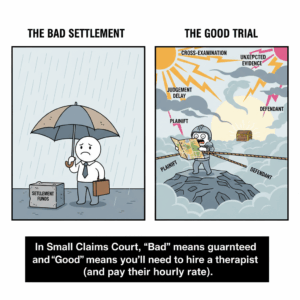“A Bad settlement is always better than a good trial.”
I would not agree with this phrase entirely—a settlement is not supposed to be good or bad. Instead, it must be acceptable for a party to the Small Claims Court proceedings. Nevertheless, it’s a good saying to remember, and judges often repeat it in small claims courtrooms.
The phrase emphasizes that a settlement is a crucial objective for both parties to strive for and consider in the Small Claims Court matter.
Benefits of the settlement
What benefits can both parties obtain if they settle a Small Claims lawsuit without a trial? Broadly, there are four:
- Save money on legal expenses.
- Avoid a trial, which is usually a stressful and time-consuming experience.
- Plan your finances. A settlement is a good way to eliminate risks that inevitably exist in a Small Claims trial procedure.
- Complete the matter without assuming liability. A settlement does not necessarily mean that the paying party admits liability or acknowledges wrongdoing. Both parties usually accept a settlement on a without prejudice basis and for the sole purpose of avoiding further litigation. They may specifically note this condition in a settlement agreement.

How the Small Claims Court enforces settlements
- Despite the good reasons outlined above, a common concern is that one of the parties may not adhere to the settlement conditions.
- Small Claims Court practices are pretty elaborate. They ensure that a settlement at any stage of the procedure is enforceable.
- In all cases, a settlement should be documented in a written agreement. It must use precise language to describe what each party is required to do. For example, the defendant agrees to pay a certain amount. In this case, an agreement must include the amount and timing of payments. If the parties agree on an installment plan, the agreement should specify the amount and date of each installment.
A Small Claims Court settlement agreement should include specific provisions to discourage a defendant from non-payment. First, if a party is in default of any payment, the other party is entitled to obtain a judgment against the non-payer for the entire amount of the initial claim. Second, it means that a judge may issue the judgment without a trial based on evaluating the damages in the absence of the defaulting party.






